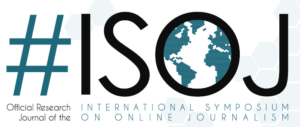Research on Cuban media and news coverage of Chilean earthquake receive top awards at ISOJ 2019
Papers on growing digital media in Cuba, and news coverage of a highly politicized earthquake in Chile, won top awards as part of the 20th ISOJ conference and the 2019 #ISOJ Journal.
Shearon Roberts and Magdalena Saldaña were the authors of the winning papers in this year’s edition of #ISOJ, which is the official research journal of the International Symposium on Online Journalism (ISOJ). The theme of the call for papers for this year’s journal was “Digital Media and Democracy in the Americas.”
Roberts, an assistant professor of Mass Communications at Xavier University of Louisiana, is the winner of the ISOJ Guest Editors’ Top Paper Award. Guest editors Pablo Boczkowski, who is a professor in the Department of Communication Studies at Northwestern University, and Eugenia Mitchelstein, who is an associate professor and director of the communication degree at the University of San Andrés in Argentina, said: “Our recommendation as guest editors was to give the top paper award to Shearon based on two criteria: it had the highest scores from the peer-review process; and, as guest editors, we also thought it was the strongest paper.”
Roberts’ research “Mixing the old with the new through digital media: How young Cuban journalists navigate a changing Cuba,” explored the impact of technology on Cuba’s media landscape.
“There is often the assumption that because state and self-censorship occurs in the Cuban press, that topics about political change, economic hardships, social well-being, education and even issues around race do not exist in traditional media in Cuba. However, this study outlines that it does exist, but not in the traditional ways that Western journalism can approach these issues in news discourse,” Roberts said.
“Younger journalists in Cuba are able to incorporate digital conversations about a changing Cuba into news discourse on traditional platforms because the topics are becoming more commonplace online either in blogs, social media platforms or through offline mobile networks.”
Magdalena Saldaña, assistant professor in the School of Communications at Pontificia Universidad Católica de Chile, won the ISOJ Top Paper Award, “based on capturing the essence of the ISOJ research component of the program.” It was selected by the ISOJ Chair, Rosental Alves, and Research Chair, Amy Schmitz Weiss.
“Exposing the president: The political angle of a natural disaster in Chile,” looked at reporting and source selection for the 2014 earthquake in northern Chile. The paper was part of Saldaña’s doctoral dissertation.
“Findings of this study are important because they help us to better understand the role of political ideology in the news production process,” Saldaña explained. “It is hard for young democracies like Chile (and other Latin American countries) to achieve a press that is completely free. But at least this study shows journalists are aware of the forces influencing news content. That’s a first step toward building an independent, more robust news media landscape.”
“We were very proud of the papers included in the 2019 edition of #ISOJ Journal and grateful to the guest editors Pablo Boczkowski and Eugenia Mitchelstein. We are also thankful to Barbie Zelizer, a professor at University of Pennsylvania Annenberg School of Communication, who wrote a special commentary about the papers, which was presented at the conference and published in the #ISOJ Journal,” said professor Rosental Alves, founder and director of ISOJ.
The #ISOJ Journal was first published in April 2011. This was the second year that the issue had a special theme and guest editors.
This year’s #ISOJ journal is available for free download on isoj.org. Each of the articles in it went through a blind peer-review process and authors of the selected papers presented their research during ISOJ on April 12, 2019 at the Blanton Museum of Art on the University of Texas at Austin campus.

